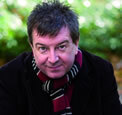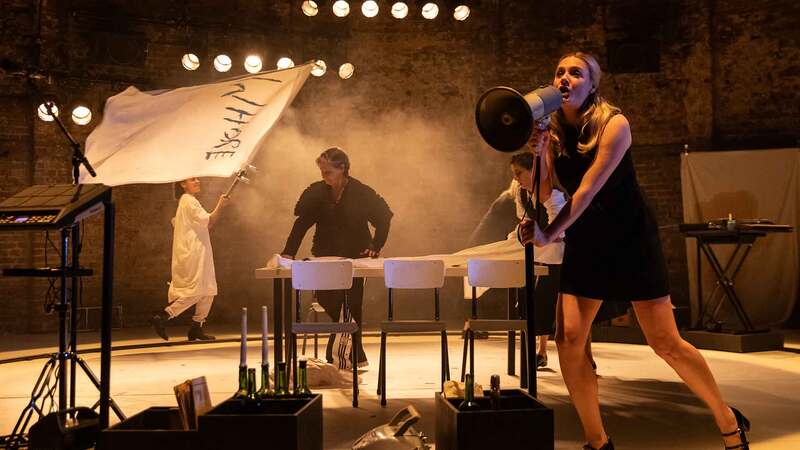You are viewing your 1 free article this month. Login to read more articles.
Stuart Maconie: From Surbiton to Slough
Stuart Maconie's timing in writing a book about Middle England could not have been better. That much maligned British social group has been thrust into the headlines recently after the Russell Brand and Jonathan Ross furore over their comments about Andrew Sachs on Radio 2. Some commentators have described public reaction, which sparked more than 37,000 complaints and led to the resignation of the controller of BBC Radio 2 and BBC 6 Music Lesley Douglas, as "the revenge of Middle England".
Douglas was Maconie's boss at both Radio 2 and 6 Music, and Maconie attended farewell drinks for her the night before this interview. However, he thinks that along with Douglas, Middle England has been misrepresented in the row. "The authentic voice of Middle England is much more kindly, relaxed, gentle and tolerant than they are given credit for," he says. "It's conservative with a small 'c' in that it likes tradition. I don't think it's as easily characterised as people think."
Following last year's surprise hit Pies and Prejudice, the Lancastrian has followed it with Adventure on the High Teas: In Search of Middle England. He says that having examined the North, he and his editor decided that Middle England had such a fluid meaning that it was rife for another "weird hybrid of pop-sociology and opinion", as Maconie describes his books. "You hear Middle England being used all the time but I thought 'what does it mean?'," he explains. "Said by someone in the Groucho Club, it's right wing, hang 'em and flog 'em, retired colonels. Said by someone in a country pub over a pint of foaming ale, it means decency and tradition."
Into the breach
So Maconie set out armed with notepad and digital camera in search of what Middle England actually stands for in places like the Chilterns, Ludlow and Melton Mowbray. He says he found that its identity is not in politics but "in how it talks about food, sex and humour". He adds: "An Englishman will say that he is terrible in bed before he will say that he has no sense of humour."
The British sense of humour led Maconie to Surbiton, home of "The Good Life", and Slough, which has been roundly mocked from John Betjeman through to "The Office". Maconie jokes that he is curious as to how that chapter will be viewed by Amazon, whose UK headquarters are in Slough. "I went really not wanting to be agreeing with Betjeman and all those people," he says. "I wanted to go and say 'you're all wrong about Slough and it's fantastic." And? "Well," he says after a considerable pause, "it's no Tunbridge Wells. But even so, I spent an hour eating in a Portuguese cafe where the members of the local Portuguese community were talking about their national football team. This is as much a part of Middle England as bringing back the birch."
One thing that struck Maconie was how riddled with contradictions Middle England is, with its attitude to crime being a case in point. "It's meant to be hugely law abiding but loves crime and darkness and hugely nasty things," he says. "'Midsomer Murders' is a great example. Comfort viewing for Middle England on a Sunday night is John Nettles investigating a host of grisly murders in pretty villages." He says that, Nettles aside, the popularity of the amateur sleuth underlines a very British disrespect for authority.
So if Middle England isn't retired colonels, "disgusted from Tunbridge Wells" and people calling for the return of National Service, what is it? Similar to the ubiquitous Gregg's pastry shops and high-visibility tabards that were the symbols of northern England in Pies and Prejudice, Maconie has a list of things that will forever be Middle England. These include bunches of flowers taped to pelican crossings to commemorate road accidents, craft fairs, Thai restaurants, farmers' markets, and "little groups of smokers standing outside country pubs underneath those heaters".
He also says that much-hated rail network serves as a metaphor for England. "There's something about the railway network, complicated and bizarre, that is British in the same way that the highway, going on forever and representing freedom, is American."
Maconie says that he was keen to avoid the cliche of falling into the north/south divide with this book: "I think there will be a lot of people who assume I take the piss out of Middle England for 300 pages. And I don't. If anything, it's a love letter to it.
"I am very proud of my northern roots but if you would rather live in Rotherham or Chorley than Bath or Ludlow, you are mad."
Despite his success as a travel writer, Maconie seems quite content to continue to write about the UK but is unclear where his travels will next take him. "You could probably write about nothing but the British Isles forever and find new and interesting things to say. I don't feel any pressing need to but I'm at the point like where a band has finished an album and doesn't want to do anything else." However, he confesses that he feels guilty that his books are classed as travel. "I feel quite sheepish when I read about those people who have gone and lived with nomads. Even more so with this one. Some of my research involved going to nice restaurants in Ludlow. It's hell."
Stuart Maconie Adventure on the High Teas: In Search of Middle England (Ebury, April, pb, £11.99, 9780091926502)









